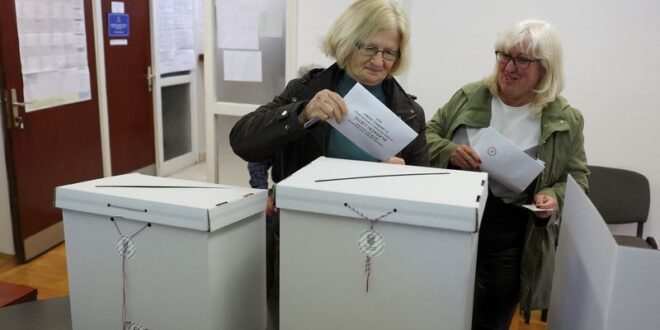ZAGREB (Reuters) -Croatia’s ruling HDZ party won Wednesday’s parliamentary election but with fewer seats than before and without a majority, according to preliminary results.
The HDZ was won 60 seats in the 151-seat parliament, according to preliminary results from 94.4% of polling stations counted.
A coalition led by the opposition Social Democratic Party was set to come in second with 42 seats, while the right-wing Homeland Movement was set to take third place with 14.
The vote was seen as a popularity test for Prime Minister Andrej Plenkovic and his HDZ party, which has dominated politics since Croatia’s independence from a crumbling federal Yugoslavia in 1991.
The outcome could also dictate major policy, including how the Croatian government views the conflict in Ukraine, and relations with the European Union. Plenkovic supports Ukraine; the opposition does not.
The slim victory will likely usher in a period of political instability in the EU member state as the main parties seek to forge alliances with other factions with differing political views.
“The HDZ won parliamentary election for the third consecutive time. As of tomorrow we will move towards securing the parliamentary majority in order to be able to form the government,” Plenkovic said after midnight.
The Homeland Movement could emerge as kingmaker, although publicly it has not said which party – if any – it will back.
The HDZ (Croatian Democratic Union) had hoped to ride the long-term support it has for overseeing Croatia’s accession to the EU, the introduction of the euro and a boom in tourists visiting the Adriatic coastline.
But many have grown tired of the party and its many graft scandals, including Plenkovic’s appointment of a state attorney known for links with people involved in corrupt dealings, may dent its majority. Plenkovic denies wrongdoing.
The opposition SDP had hoped for a better result, its leader Pedja Grbin said.
“It is not over. Days, weeks and perhaps months of talks are ahead of us and they will result in the change that will make Croatia a better place. We will start talks as of tomorrow,” he said.
The State Election Commission said turnout on Wednesday was 61.83%.
“Regardless of the final distribution of seats, it is likely the parliament will be more fragmented and coalition negotiations will drag on for longer,” said Mario Bikarski, East and Central Europe Analyst at risk intelligence company Verisk Maplecroft.
“A minority government, either HDZ- or SDP-led, would be even more unstable and unlikely to last its full term.”
(Reporting by Antonio Bronic and Fedja Grulovic; Writing by Ivana Sekularac; Editing by Christina Fincher, Gareth Jones and Stephen Coates)
 BeritaKini.biz Berita Viral Terkini di Malaysia
BeritaKini.biz Berita Viral Terkini di Malaysia





